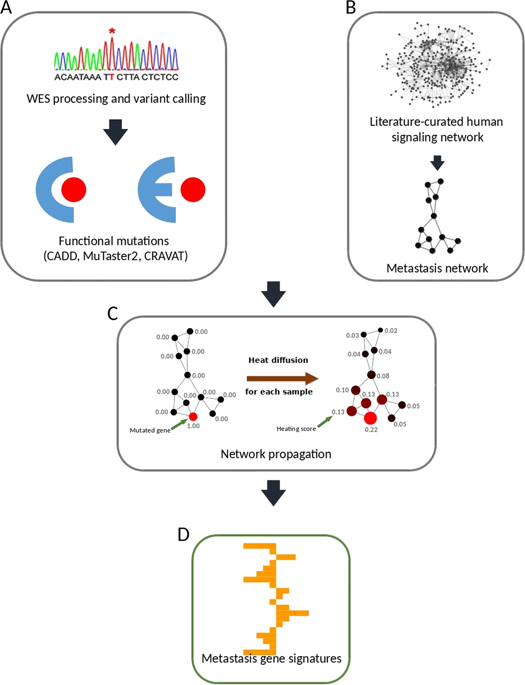npj Precision Oncology ( IF 6.8 ) Pub Date : 2019-11-01 , DOI: 10.1038/s41698-019-0100-7 Jean-Sébastien Milanese 1 , Chabane Tibiche 1 , Jinfeng Zou 1 , Zhigang Meng 2, 3 , Andre Nantel 1 , Simon Drouin 1 , Richard Marcotte 1, 4 , Edwin Wang 2, 5

|
Germline variants such as BRCA1/2 play an important role in tumorigenesis and clinical outcomes of cancer patients. However, only a small fraction (i.e., 5–10%) of inherited variants has been associated with clinical outcomes (e.g., BRCA1/2, APC, TP53, PTEN and so on). The challenge remains in using these inherited germline variants to predict clinical outcomes of cancer patient population. In an attempt to solve this issue, we applied our recently developed algorithm, eTumorMetastasis, which constructs predictive models, on exome sequencing data to ER+ breast (n = 755) cancer patients. Gene signatures derived from the genes containing functionally germline variants significantly distinguished recurred and non-recurred patients in two ER+ breast cancer independent cohorts (n = 200 and 295, P = 1.4 × 10−3). Furthermore, we compared our results with the widely known Oncotype DX test (i.e., Oncotype DX breast cancer recurrence score) and outperformed prediction for both high- and low-risk groups. Finally, we found that recurred patients possessed a higher rate of germline variants. In addition, the inherited germline variants from these gene signatures were predominately enriched in T cell function, antigen presentation, and cytokine interactions, likely impairing the adaptive and innate immune response thus favoring a pro-tumorigenic environment. Hence, germline genomic information could be used for developing non-invasive genomic tests for predicting patients’ outcomes in breast cancer.
中文翻译:

与白细胞基因相关的种系变异可预测乳腺癌患者的肿瘤复发
BRCA1/2 等种系变异在肿瘤发生和癌症患者的临床结果中发挥着重要作用。然而,只有一小部分(即5-10%)遗传变异与临床结果相关(例如BRCA1/2、APC、TP53、PTEN等)。使用这些遗传种系变异来预测癌症患者群体的临床结果仍然存在挑战。为了解决这个问题,我们将我们最近开发的算法 eTumorMetastasis 应用于 ER+ 乳腺癌 (n = 755) 癌症患者的外显子组测序数据,该算法构建了预测模型 。源自包含功能性种系变异的基因的基因特征显着区分了两个 ER+ 乳腺癌独立队列中的复发患者和非复发患者(n = 200 和 295,P = 1.4 × 10 -3)。此外,我们将我们的结果与众所周知的 Oncotype DX 测试(即 Oncotype DX 乳腺癌复发评分)进行了比较,结果优于高风险组和低风险组的预测。最后,我们发现复发患者具有更高比例的种系变异。此外,来自这些基因特征的遗传种系变异主要富集T细胞功能、抗原呈递和细胞因子相互作用,可能损害适应性和先天免疫反应,从而有利于促肿瘤发生环境。因此,种系基因组信息可用于开发非侵入性基因组测试,以预测乳腺癌患者的结果。











































 京公网安备 11010802027423号
京公网安备 11010802027423号